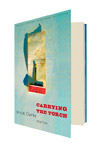I’ve often wished that book reviews weren’t so full of clever assertion and instead simply presented the reader with a fair sampling of what they might expect. Here, then, is the sort of writing you might expect from Clarke’s second story collection:
It was the loneliest feeling imaginable, like writing thank-you notes from the bottom of a volcano.
He was a teenager, she saw, a normal teenager except sadder, which is to say he was the saddest person she had ever seen.
Our two boys were in their bedroom, arguing in their high, sweet voices about the most effective way to slaughter fire ants.
“Fellows,” the coach said, “if a man cannot be moved by the sight of young Christian women eating soft ice cream, then a man cannot be moved.”
Over the past few years, Clarke has become one of the few story writers I bother to read, because his work continues to evolve; it is charged with the danger of the unexpected, a shocking blend of calamity and pathos.
The stories in Carrying the Torch are mostly about marriages breaking down. They are set in the suburbs of the South, and his narrators assume a lucid, even courtly tone, as they charge toward ruin. Imagine Barry Hannah crashing cocktail hour at the Cheever residence.
The central joy of reading Clarke is that his people want things. They are afflicted by their wants:
Over the next month time became liquid and awful. One moment I was eating dinner with my family, awash in their good company and the slow dawning of Lily’s forgiveness and the bounty of vegetables from her garden; the next, it was three in the morning and… I was remembering Amy, remembering what it felt like to touch someone new for the first time—which was about sex—and then to touch them a second or third or fourth time—which was about something else, something private and more complicated and terrible and closer to love.
I can’t tell you what a joy it is to read such prose, to feel the sting of human desire, particularly because the literary landscape is so full of drab, meandering stories in which the ironic mode is used to convey the essential idea that nothing much matters.
The tellers in Carrying the Torch are capable of biting irony, but they are not ironic. They struggle, quite openly, against their own sin, against betrayal, against losses that have turned them into people they do not wish to be.
I don’t mean to suggest here that Clarke is a strict realist. A number of his stories exude a gentle surrealism. One opens like this:
I was driving through Savannah, Georgia, and discovered that the city was deserted, agreeably so, and so I made some inquiries and one thing led to another and I ended up buying the whole city, cheap.
Clarke has a fine time with this conceit, roasting the unctuous marketing schemes that pass for civic identity in the New South. But his emotional intent is never in doubt. Our narrator purchases Savannah in the hope of winning back his estranged wife. The story is properly understood as a love song.
This is what Clarke does: he imbues the dark particulars of human failure with a strange radiance. He has created, in Carrying the Torch, an authentic humor of despair.





